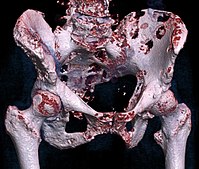
Photo from wikipedia
Osteolytic bone resorption is the primary cause of pain and suffering (e.g. pathological bone fracture) in women with metastatic breast cancer. The current standard of care for patients with bone… Click to show full abstract
Osteolytic bone resorption is the primary cause of pain and suffering (e.g. pathological bone fracture) in women with metastatic breast cancer. The current standard of care for patients with bone metastasis for reducing the incidence of skeletal complications includes bisphosphonates and a humanized antibody (denosumab). However, a subset of patients on these therapies still develops new bone metastasis or experiences adverse effects. Moreover, some bisphosphonates have poor oral bioavailability. Therefore, orally-bioavailable and non-toxic inhibitors of breast cancer-induced osteolytic bone resorption are still clinically desirable. We have shown previously that benzyl isothiocyanate (BITC) decreases the incidence of breast cancer in a transgenic mouse model without any side effects. The present study provides in vivo evidence for inhibition of breast cancer-induced osteolytic bone resorption by BITC. Plasma achievable doses of BITC (0.5 and 1 μM) inhibited in vitro osteoclast differentiation induced by co-culture of osteoclast precursor cells (RAW264.7) and breast cancer cells representative of different subtypes. This effect was accompanied by downregulation of key mediators of osteoclast differentiation, including receptor activator of nuclear factor-κB ligand and runt-related transcription factor 2 (RUNX2), in BITC-treated breast cancer cells. Doxycycline-inducible knockdown of RUNX2 augmented BITC-mediated inhibition of osteoclast differentiation. Oral administration of 10 mg BITC/kg body weight, 5 times per week, inhibited MDA-MB-231-induced skeletal metastasis multiplicity by ~81% when compared with control (P = 0.04). The present study indicates that BITC has the ability to inhibit breast cancer-induced osteolytic bone resorption in vivo.
Journal Title: Carcinogenesis
Year Published: 2018
Link to full text (if available)
Share on Social Media: Sign Up to like & get
recommendations!